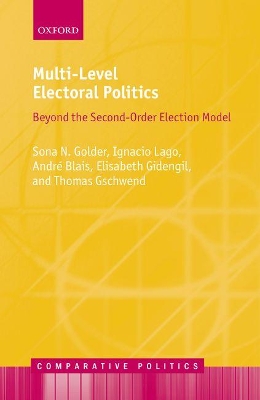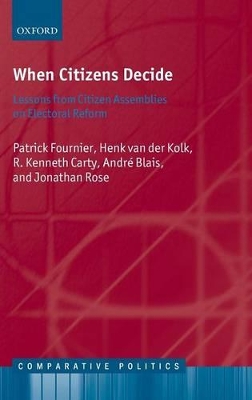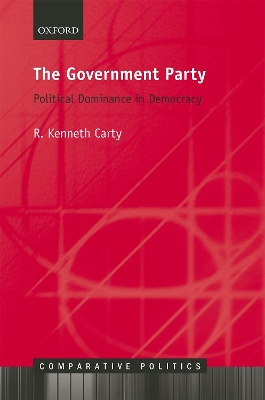Comparative Politics
3 total works
Multi-Level Electoral Politics
by Sona Nadenichek Golder, Ignacio Lago, Andre Blais, Elisabeth Gidengil, and Thomas Gschwend
Published 12 October 2017
National-level elections receive more attention from scholars and the media than elections at other levels, even though in many European countries the importance of both regional and European levels of government has grown in recent years. The growing importance of multiple electoral arenas suggests that scholars should be cautious about examining single levels in isolation. Taking the multilevel structure of electoral politics seriously requires a re-examination of
how the incentives created by electoral institutions affect the behaviour of voters and party elites.
The standard approach to analysing multilevel elections is the second-order election (SOE) model, in which national elections are considered to be first-order elections while other elections are second order. However, this model does not provide micro mechanisms that determine how elections in one arena affect those in another, or explain variations in individual voting behaviour.
The objective of this book is to explain how party and voter behaviour in a given election is affected by the existence of multiple electoral arenas. It provides original qualitative and quantitative data to examine European, national, and subnational elections in France, Germany, and Spain from 2011-2015. The volume examines party mobilization efforts across multiple electoral arenas, as well as decisions by individual voters with respect to turnout, strategic voting, and accountability. This
book provides the first systematic analysis of multilevel electoral politics at three different levels across multiple countries.
Comparative Politics is a series for researchers, teachers, and students of political science that deals with contemporary government and politics. Global in scope, books in the series are characterised by a stress on comparative analysis and strong methodological rigour. The series is published in association with the European Consortium for Political Research. For more information visit: www.ecprnet.eu.
The series is edited by Emilie van Haute, Professor of Political Science, Universite libre de Bruxelles; Ferdinand Muller-Rommel, Director of the Center for the Study of Democracy, Leuphana University; and Susan Scarrow, Chair of the Department of Political Science, University of Houston.
how the incentives created by electoral institutions affect the behaviour of voters and party elites.
The standard approach to analysing multilevel elections is the second-order election (SOE) model, in which national elections are considered to be first-order elections while other elections are second order. However, this model does not provide micro mechanisms that determine how elections in one arena affect those in another, or explain variations in individual voting behaviour.
The objective of this book is to explain how party and voter behaviour in a given election is affected by the existence of multiple electoral arenas. It provides original qualitative and quantitative data to examine European, national, and subnational elections in France, Germany, and Spain from 2011-2015. The volume examines party mobilization efforts across multiple electoral arenas, as well as decisions by individual voters with respect to turnout, strategic voting, and accountability. This
book provides the first systematic analysis of multilevel electoral politics at three different levels across multiple countries.
Comparative Politics is a series for researchers, teachers, and students of political science that deals with contemporary government and politics. Global in scope, books in the series are characterised by a stress on comparative analysis and strong methodological rigour. The series is published in association with the European Consortium for Political Research. For more information visit: www.ecprnet.eu.
The series is edited by Emilie van Haute, Professor of Political Science, Universite libre de Bruxelles; Ferdinand Muller-Rommel, Director of the Center for the Study of Democracy, Leuphana University; and Susan Scarrow, Chair of the Department of Political Science, University of Houston.
When Citizens Decide
by Patrick Fournier, Henk van der Kolk, R Kenneth Carty, Andre Blais, and Jonathan Rose
Published 1 January 2011
Three unprecedented large-scale democratic experiments have recently taken place. Citizen assemblies on electoral reform were conducted in British Columbia, the Netherlands, and Ontario. Groups of randomly selected ordinary citizens were asked to independently design the next electoral system. In each case, the participants spent almost an entire year learning about electoral systems, consulting the public, deliberating, debating, and ultimately deciding what
specific institution should be adopted.
When Citizens Decide uses these unique cases to examine claims about citizens' capacity for democratic deliberation and active engagement in policy-making. It offers empirical insight into numerous debates and provides answers to a series of key questions: 1) Are ordinary citizens able to decide about a complex issue? Are their decisions reasonable? 2) Who takes part in such proceedings? Are they dominated by people dissatisfied by the status quo? 3) Do some citizens play a more
prominent role than others? Are decisions driven by the most vocal or most informed members? 4) Did the participants decide by themselves? Were they influenced by staff, political parties, interest groups, or the public hearings? 5) Does participation in a deliberative process foster citizenship? Did participants
become more trusting, tolerant, open-minded, civic-minded, interested in politics, and active in politics? 6) How do the other political actors react? Can the electorate accept policy proposals made by a group of ordinary citizens?
The analyses rely upon various types of evidence about both the inner workings of the assemblies and the reactions toward them outside: multi-wave panel surveys of assembly members, content analysis of newspaper coverage, and public opinion survey data. The lessons drawn from this research are relevant to those interested in political participation, public opinion, deliberation, public policy, and democracy.
Comparative Politics is a series for students, teachers, and researchers of political science that deals with contemporary government and politics. Global in scope, books in the series are characterised by a stress on comparative analysis and strong methodological rigour. The series is published in association with the European Consortium for Political Research. For more information visit: www.essex.ac.uk/ecpr. The Comparative Politics Series is edited by Professor
David M. Farrell, School of Politics and International Relations, University College Dublin, Kenneth Carty, Professor of Political Science, University of British Columbia, and Professor Dirk Berg-Schlosser, Institute of Political Science, Philipps University, Marburg.
specific institution should be adopted.
When Citizens Decide uses these unique cases to examine claims about citizens' capacity for democratic deliberation and active engagement in policy-making. It offers empirical insight into numerous debates and provides answers to a series of key questions: 1) Are ordinary citizens able to decide about a complex issue? Are their decisions reasonable? 2) Who takes part in such proceedings? Are they dominated by people dissatisfied by the status quo? 3) Do some citizens play a more
prominent role than others? Are decisions driven by the most vocal or most informed members? 4) Did the participants decide by themselves? Were they influenced by staff, political parties, interest groups, or the public hearings? 5) Does participation in a deliberative process foster citizenship? Did participants
become more trusting, tolerant, open-minded, civic-minded, interested in politics, and active in politics? 6) How do the other political actors react? Can the electorate accept policy proposals made by a group of ordinary citizens?
The analyses rely upon various types of evidence about both the inner workings of the assemblies and the reactions toward them outside: multi-wave panel surveys of assembly members, content analysis of newspaper coverage, and public opinion survey data. The lessons drawn from this research are relevant to those interested in political participation, public opinion, deliberation, public policy, and democracy.
Comparative Politics is a series for students, teachers, and researchers of political science that deals with contemporary government and politics. Global in scope, books in the series are characterised by a stress on comparative analysis and strong methodological rigour. The series is published in association with the European Consortium for Political Research. For more information visit: www.essex.ac.uk/ecpr. The Comparative Politics Series is edited by Professor
David M. Farrell, School of Politics and International Relations, University College Dublin, Kenneth Carty, Professor of Political Science, University of British Columbia, and Professor Dirk Berg-Schlosser, Institute of Political Science, Philipps University, Marburg.
Democracy thrives on vigorous competition between political parties. However, in several established democracies one party manages to dominate national politics for decades at a time, seemingly creating a democratic one-party unnatural democracy. This book examines five such countries - Canada, Ireland, India, Japan, Italy - to understand what kind of party comes to dominate democratic competition, and how and why they do so. In different countries with different
political challenges, an analysis of their 'Government Parties' reveals their common relationship with the origins and operations of the states they dominate, and the nation- and/or state-building challenges they face. Democratic dominance cannot last forever; how a government party responds to the
seemingly inevitable decline of long-term support defines the prospects for its unnatural democracy.
Comparative Politics is a series for researchers, teachers, and students of political science that deals with contemporary government and politics. Global in scope, books in the series are characterized by a stress on comparative analysis and strong methodological rigour. The series is published in association with the European Consortium for Political Research. For more information visit www.ecprnet.eu
The series is edited by Susan Scarrow, John and Rebecca Moores Professor of Political Science at the University of Houston, and Jonathan Slapin, Professor of Political Institutions and European Politics, Department of Political Science, University of Zurich.
political challenges, an analysis of their 'Government Parties' reveals their common relationship with the origins and operations of the states they dominate, and the nation- and/or state-building challenges they face. Democratic dominance cannot last forever; how a government party responds to the
seemingly inevitable decline of long-term support defines the prospects for its unnatural democracy.
Comparative Politics is a series for researchers, teachers, and students of political science that deals with contemporary government and politics. Global in scope, books in the series are characterized by a stress on comparative analysis and strong methodological rigour. The series is published in association with the European Consortium for Political Research. For more information visit www.ecprnet.eu
The series is edited by Susan Scarrow, John and Rebecca Moores Professor of Political Science at the University of Houston, and Jonathan Slapin, Professor of Political Institutions and European Politics, Department of Political Science, University of Zurich.


